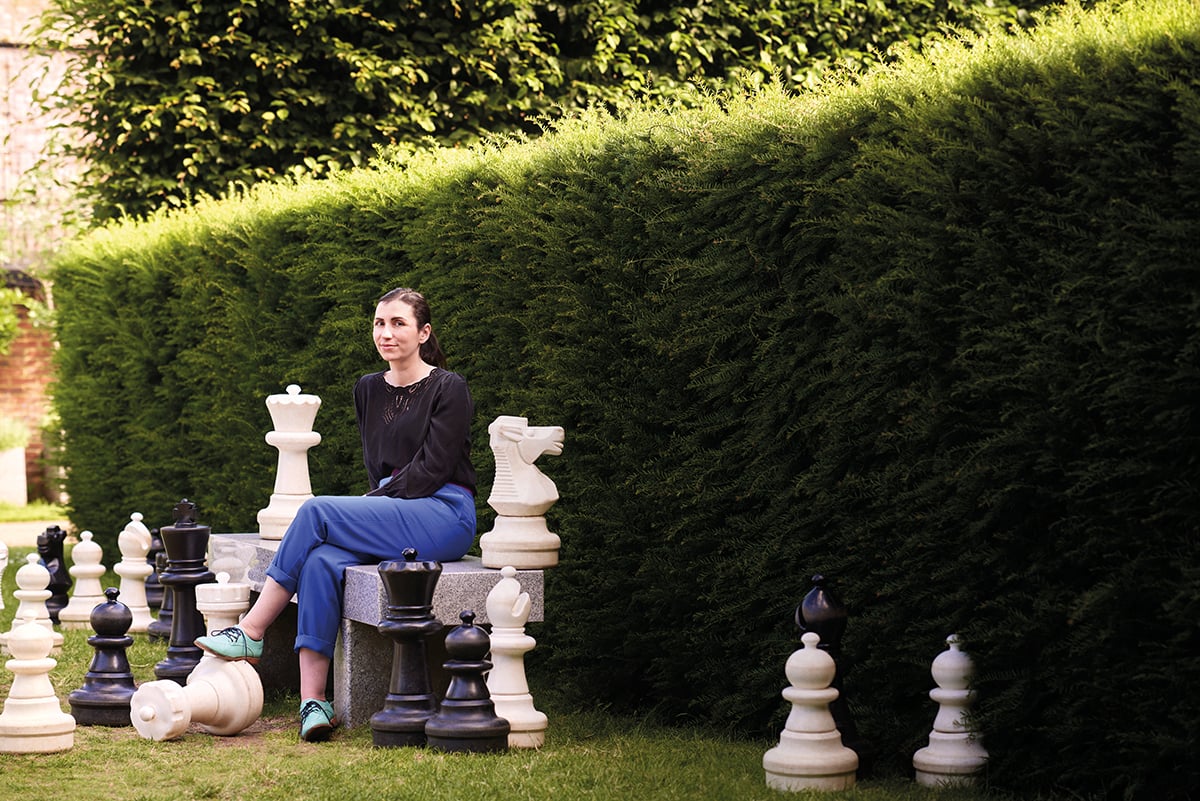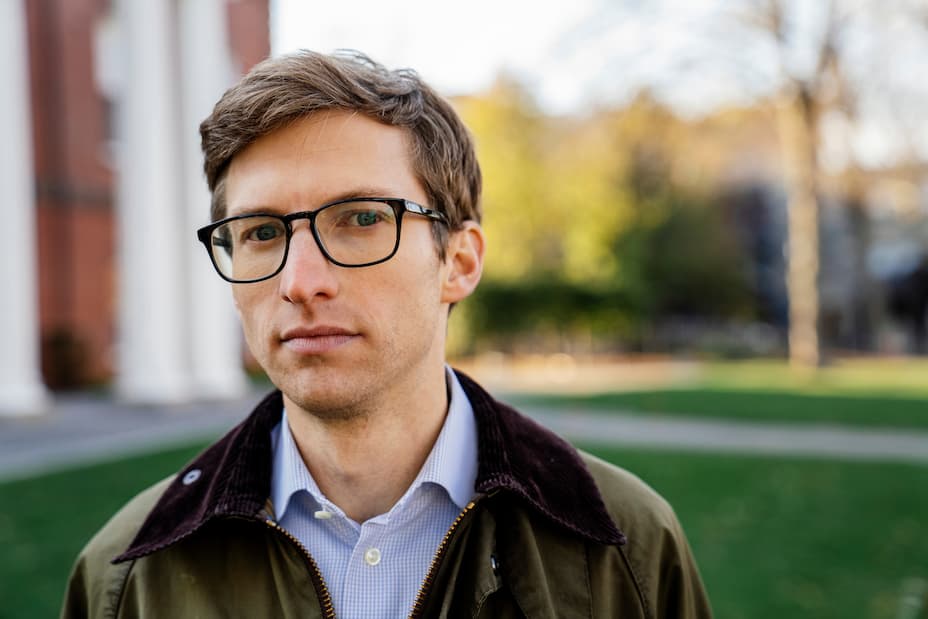
Photography by Dylan Collard
Location courtesy of Jason Kouchak
Kelly Clancy’s decision to quit academia for DeepMind in London in 2019 caught university colleagues off guard. The Google-owned artificial intelligence lab had made its name by defeating two world champions of Go, the Chinese board game. But Clancy’s friends were puzzled. Why step away from biophysics experiments to join an effort with seemingly few practical applications?
“They were like: ‘What is the point of spending hundreds of millions of dollars training AI to play games?’” she recalls. “And I didn’t have a great answer to begin with. But the more I researched it, the more I realised there was this huge history of using games as a model of how we think and as simulations of the world.”
That research laid the groundwork for Playing With Reality: How Games Shape Our World, which Clancy wrote after leaving DeepMind and returning to her native US. The multi-millennium account brilliantly interweaves neuroscience, evolutionary biology, economics, business, military strategy and the origins of democracy.
At the heart of Clancy’s thesis is the idea that we’re all wired to play. Surprise, a key part of that, acts as a “learning signal”, she explains, causing the neurotransmitter dopamine to biologically encode whether our choices turned out better or worse than expected.
The brain works by “building models of the world to anticipate what’s going to happen”, Clancy says. “So, when it encounters something it doesn’t understand, that it can’t predict, that’s very compelling. Unpredictable things can be scary. But play brings unpredictability into a safe place we can explore.”
Learning and commerce
She observes that play is common across the animal kingdom, describing how experiments with rats demonstrate that those who miss out in their early months often become troubled adults. “They’re more hostile, they’re aggressive, they can’t read their peers’ social cues.”
But it’s not just about ‘playing nicely’. Great fortunes have also been built on our love of diversion, from what’s thought to be the world’s first casino in Venice in the 1600s to gaming giants such as Roblox and Nintendo today.
“A ton of CEOs’ earliest introduction to tech was building video games or games engines,” Clancy adds, naming DeepMind’s Sir Demis Hassabis, Tesla’s Elon Musk and Salesforce’s Marc Benioff as examples. Moreover, she says games still have much to teach the corporate world about putting the right incentives in place.
“The Google graveyard is infamous,” she notes. “They launch all these products and then, shortly after, cut them. The reason is Google promotes employees for starting exciting new projects but not for maintaining them. Business is like a game-design problem of how to get the behaviours you want out of the employees you have.”
A well-designed game can be remarkably long-lasting. Clancy recalls one example she encountered as a Peace Corps volunteer teaching English in Turkmenistan two decades ago.
“There’s a popular game the kids play there with sheep knucklebones,” she says. “I later looked it up to see how old it was – they’ve found sheep bones in the graves of children in that area from 7,000 years ago.
“[That suggests] it’s evolutionarily ancient. And evolution doesn’t keep things around unless they’re really useful.”
Chess down the ages
Chess, another game with ancient roots, crops up many times in Playing With Reality. The book cites a 13th-century friar who used it as an allegory to teach people to accept their place in society.
It tells how Freudians suggested chess satisfies the Oedipal urge to render a father figure impotent. And it describes how AI researchers treated it as a problem to be ‘solved’.
Somewhat surprisingly, Clancy has never played. “My family was a little bit blue-collar and not into that kind of thing,” she says. “I have some jealousy when people say, ‘Oh, what a beautiful move, how inspired’. Being completely illiterate at chess, I just have to believe what they’re saying.”
Clancy, instead, spent part of her youth playing computer games, including Myst. “I never got very far, but I loved puzzle games,” she says.

However, she’s critical of another popular series from her childhood. SimCity’s libertarian, small-government philosophy was baked into its design and could nudge players towards questionable choices, Clancy claims. Her book describes how one of the most successful strategies involved building a city without schools, hospitals, parks or firefighters.
“Tons of people went into urban design because of that game, and a lot of them thought it was an objective model of how cities work,” she says. “But it’s really just based on crazy equations.”
Game theory
This brings Clancy to the other motivation for her book: to warn of games’ potential for harm. Just as games can teach us to optimise our behaviours, they can also lead us astray.
“Games play us,” Clancy warns. “We think of games as harmless things or pastimes, but they’re actually extremely powerful regulators of human behaviour.”
In particular, she charts the rise of game theory in the mid-20th century and its influence on the social sciences, regulation, military strategy and business.
This branch of mathematics investigates decision-making in situations where people’s choices affect themselves and each other. The standard version assumes all the ‘players’ are rational and self-interested, seeking to predict how they will act in various scenarios.
“It’s a model of agents that are fundamentally selfish and self-interested,” says Clancy. “And that’s been rebranded by game theorists as ‘rationality’. But when we compare the predictions of game theory with the behaviours of real humans, they’re not really alike.”

Clancy argues that humans are, by nature, more social and less rule-bound, making the world more complex than game theory suggests. And she cautions that we ignore this at society’s peril.
“We play games the way the game invites us to play,” she says. “So if our systems model us as purely selfish agents, then we’ll act like selfish agents – because that’s how you win.”
But games can also be a force for good, Clancy adds, particularly in education.
“There are great examples of the gamification of genuine learning. For example, Miegakure, which helps people understand how a fourth spatial dimension would work,” she says, referring to a video game set in a world in which the computer represents each object’s position using four numbers instead of the usual three.
It’s hard to understand until you play it. And that’s the point. Just as games have shaped our history, they can continue expanding our minds as long as there are novel ideas and technologies to inspire new ways to play.
State of play
An array of innovative companies are tapping into the gaming instinct, including:
AMD
Its graphics processing chips are at the heart of this generation’s most powerful consoles
Epic Games
Creator of last-person-standing shooter game Fortnite and developer tool Unreal Engine
Games Workshop
Designer of Warhammer and Lord of the Rings tabletop miniatures games
Microsoft
Recently added Call of Duty maker Activision Blizzard to its roster of games companies
Nintendo
Owns some of video gaming’s best-loved franchises, eg Mario, Donkey Kong and Zelda
NVIDIA
Its graphics cards deliver spectacular detail, lighting and frame rates to PC gamers
Roblox
Games creation platform with more than 70 million players and developers
Sea
Garena division develops the multiplayer shooter game Free Fire and hosts worldwide esports
Sony
PlayStation Studios division launched The Last of Us and God of War, among other hits
Tencent
Owns League of Legends maker Riot Games and has stakes in dozens of other studios

© Games Workshop
Important Information
Baillie Gifford & Co and Baillie Gifford & Co Limited are authorised and regulated by the Financial Conduct Authority (FCA). Baillie Gifford & Co Limited is an Authorised Corporate Director of OEICs.
Baillie Gifford Overseas Limited provides investment management and advisory services to non-UK Professional/Institutional clients only. Baillie Gifford Overseas Limited is wholly owned by Baillie Gifford & Co. Baillie Gifford & Co and Baillie Gifford Overseas Limited are authorised and regulated by the FCA in the UK.
Persons resident or domiciled outside the UK should consult with their professional advisers as to whether they require any governmental or other consents in order to enable them to invest, and with their tax advisers for advice relevant to their own particular circumstances.
Financial Intermediaries
This communication is suitable for use of financial intermediaries. Financial intermediaries are solely responsible for any further distribution and Baillie Gifford takes no responsibility for the reliance on this document by any other person who did not receive this document directly from Baillie Gifford.
Europe
Baillie Gifford Investment Management (Europe) Ltd (BGE) is authorised by the Central Bank of Ireland as an AIFM under the AIFM Regulations and as a UCITS management company under the UCITS Regulation. BGE also has regulatory permissions to perform Individual Portfolio Management activities. BGE provides investment management and advisory services to European (excluding UK) segregated clients. BGE has been appointed as UCITS management company to the following UCITS umbrella company; Baillie Gifford Worldwide Funds plc. BGE is a wholly owned subsidiary of Baillie Gifford Overseas Limited, which is wholly owned by Baillie Gifford & Co. Baillie Gifford Overseas Limited and Baillie Gifford & Co are authorised and regulated in the UK by the Financial Conduct Authority.
Hong Kong
Baillie Gifford Asia (Hong Kong) Limited 柏基亞洲(香港)有限公司 is wholly owned by Baillie Gifford Overseas Limited and holds a Type 1 license from the Securities & Futures Commission of Hong Kong to market and distribute Baillie Gifford’s range of collective investment schemes to professional investors in Hong Kong. Baillie Gifford Asia (Hong Kong) Limited 柏基亞洲(香港)有限公司 can be contacted at Suites 2713-2715, Two International Finance Centre, 8 Finance Street, Central, Hong Kong. Telephone +852 3756 5700.
South Korea
Baillie Gifford Overseas Limited is licensed with the Financial Services Commission in South Korea as a cross border Discretionary Investment Manager and Non-discretionary Investment Adviser.
Japan
Mitsubishi UFJ Baillie Gifford Asset Management Limited (‘MUBGAM’) is a joint venture company between Mitsubishi UFJ Trust & Banking Corporation and Baillie Gifford Overseas Limited. MUBGAM is authorised and regulated by the Financial Conduct Authority.
Australia
Baillie Gifford Overseas Limited (ARBN 118 567 178) is registered as a foreign company under the Corporations Act 2001 (Cth) and holds Foreign Australian Financial Services Licence No 528911. This material is provided to you on the basis that you are a “wholesale client” within the meaning of section 761G of the Corporations Act 2001 (Cth) (“Corporations Act”). Please advise Baillie Gifford Overseas Limited immediately if you are not a wholesale client. In no circumstances may this material be made available to a “retail client” within the meaning of section 761G of the Corporations Act.
This material contains general information only. It does not take into account any person’s objectives, financial situation or needs.
South Africa
Baillie Gifford Overseas Limited is registered as a Foreign Financial Services Provider with the Financial Sector Conduct Authority in South Africa.
North America
Baillie Gifford International LLC is wholly owned by Baillie Gifford Overseas Limited; it was formed in Delaware in 2005 and is registered with the SEC. It is the legal entity through which Baillie Gifford Overseas Limited provides client service and marketing functions in North America. Baillie Gifford Overseas Limited is registered with the SEC in the United States of America.
The Manager is not resident in Canada, its head office and principal place of business is in Edinburgh, Scotland. Baillie Gifford Overseas Limited is regulated in Canada as a portfolio manager and exempt market dealer with the Ontario Securities Commission ('OSC'). Its portfolio manager licence is currently passported into Alberta, Quebec, Saskatchewan, Manitoba and Newfoundland & Labrador whereas the exempt market dealer licence is passported across all Canadian provinces and territories. Baillie Gifford International LLC is regulated by the OSC as an exempt market and its licence is passported across all Canadian provinces and territories. Baillie Gifford Investment Management (Europe) Limited (‘BGE’) relies on the International Investment Fund Manager Exemption in the provinces of Ontario and Quebec.
Israel
Baillie Gifford Overseas is not licensed under Israel’s Regulation of Investment Advising, Investment Marketing and Portfolio Management Law, 5755-1995 (the Advice Law) and does not carry insurance pursuant to the Advice Law. This material is only intended for those categories of Israeli residents who are qualified clients listed on the First Addendum to the Advice Law.
115326 10049506



